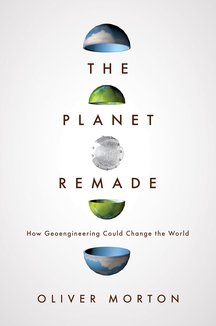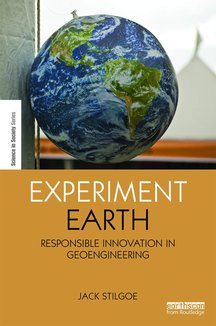Recommended Books

The Planet Remade: How Geoengineering Could Change the World
Author:
Oliver Morton
ISBN 13:
978-0691175904
A fascinating look at the perils and promise of geoengineering and our potential future on a warming planet The risks of global warming are pressing and potentially vast. The difficulty of doing without fossil fuels is daunting, possibly even insurmountable. So there is an urgent need to rethink our responses to the crisis. To meet that need, a small but increasingly influential group of scientists is exploring proposals for planned human intervention in the climate system: a stratospheric veil against the sun, the cultivation of photosynthetic plankton, fleets of unmanned ships seeding the clouds. These are the technologies of geoengineering―and as Oliver Morton argues in this visionary book, it would be as irresponsible to ignore them as it would be foolish to see them as a simple solution to the problem. The Planet Remade explores the history, politics, and cutting-edge science of geoengineering. Morton weighs both the promise and perils of these controversial strategies and puts them in the broadest possible context. The past century’s changes to the planet―to the clouds and the soils, to the winds and the seas, to the great cycles of nitrogen and carbon―have been far more profound than most of us realize. Appreciating those changes clarifies not just the scale of what needs to be done about global warming, but also our relationship to nature. Climate change is not just one of the twenty-first century’s defining political challenges. Morton untangles the implications of our failure to meet the challenge of climate change and reintroduces the hope that we might. He addresses the deep fear that comes with seeing humans as a force of nature, and asks what it might mean―and what it might require of us―to try and use that force for good.

Experiment Earth: Responsible innovation in geoengineering (The Earthscan Science in Society Series)
Author:
Jack Stilgoe
ISBN 13:
978-0415732376
Experiments in geoengineering – intentionally manipulating the Earth’s climate to reduce global warming – have become the focus of a vital debate about responsible science and innovation. Drawing on three years of sociological research working with scientists on one of the world’s first major geoengineering projects, this book examines the politics of experimentation. Geoengineering provides a test case for rethinking the responsibilities of scientists and asking how science can take better care of the futures that it helps bring about. This book gives students, researchers and the general reader interested in the place of science in contemporary society a compelling framework for future thinking and discussion.

Frontiers of Illusion: Science, Technology, and the Politics of Progress
Author:
Daniel Sarewitz
ISBN 13:
978-1566394154
For the past fifty years, science and technology―supported with billions of dollars from the U.S. government―have advanced at a rate that would once have seemed miraculous, while society's problems have grown more intractable, complex, and diverse. Yet scientists and politicians alike continue to prescribe more science and more technology to cure such afflictions as global climate change, natural resource depletion, overpopulation, inadequate health care, weapons proliferation, and economic inequality. Daniel Sarewitz scrutinizes the fundamental myths that have guided the formulation of science policy for half a century―myths that serve the professional and political interests of the scientific community, but often fail to advance the interests of society as a whole. His analysis ultimately demonstrates that stronger linkages between progress in science and progress in society will require research agendas that emerge not from the intellectual momentum of science, but from the needs and goals of society.